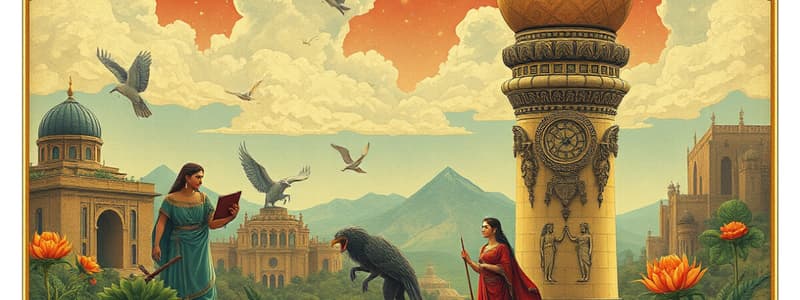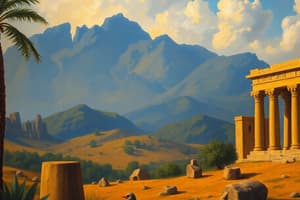Podcast
Questions and Answers
Which of the following ancient civilizations is known as the 'Cradle of Civilization'?
Which of the following ancient civilizations is known as the 'Cradle of Civilization'?
- Indus Valley Civilization
- Ancient Egypt
- Mesopotamia (correct)
- Ancient China
Which legal system is attributed to the civilization of Mesopotamia?
Which legal system is attributed to the civilization of Mesopotamia?
- Hammurabi's Code (correct)
- The Twelve Tables
- Code of Justinian
- Magna Carta
What major achievement is the Indus Valley Civilization particularly known for?
What major achievement is the Indus Valley Civilization particularly known for?
- Democratic governance
- Pyramids and monuments
- Philosophical contributions
- Advanced urban planning (correct)
Which philosophical beliefs shaped ancient Chinese society?
Which philosophical beliefs shaped ancient Chinese society?
Which civilization is credited with the birth of democracy?
Which civilization is credited with the birth of democracy?
What significant structural achievement is associated with ancient Rome?
What significant structural achievement is associated with ancient Rome?
Which ancient civilization is known for its intricate calendar and astronomy?
Which ancient civilization is known for its intricate calendar and astronomy?
Which two major religions rose during the Vedic period in ancient India?
Which two major religions rose during the Vedic period in ancient India?
Flashcards are hidden until you start studying
Study Notes
Ancient Civilizations
Mesopotamia
- Located between the Tigris and Euphrates Rivers (modern-day Iraq).
- Known as the "Cradle of Civilization".
- Developed cuneiform writing and early forms of government.
- Major city-states: Ur, Babylon, and Sumer.
- Contributions: The wheel, mathematics, and the first legal codes (Hammurabi's Code).
Ancient Egypt
- Centered around the Nile River.
- Famous for pyramids, pharaohs, and hieroglyphics.
- Religion focused on polytheism and the afterlife.
- Significant achievements in architecture, art, and medicine.
- The Old, Middle, and New Kingdoms marked different periods of power.
Indus Valley Civilization
- Located in present-day Pakistan and northwest India.
- Noted for advanced urban planning, including grid cities (Mohenjo-Daro, Harappa).
- Developed a system of weights and measures and early forms of trade.
- Writing system remains undeciphered.
- Declined around 1900 BCE, possibly due to climate change and tectonic activity.
Ancient China
- Early dynasties include Xia, Shang, and Zhou.
- Innovations: papermaking, the compass, and gunpowder.
- Confucianism and Daoism shaped philosophy and society.
- The Great Wall and Silk Road were key developments in defense and trade.
- Dynastic cycle characterized by rise and fall of ruling families.
Ancient Greece
- Composed of city-states (e.g., Athens, Sparta).
- Birthplace of democracy, philosophy (Socrates, Plato, Aristotle).
- Contributions to art, theatre, and science (Archimedes, Hippocrates).
- Significant conflicts: Persian Wars and Peloponnesian War.
- Spread of Hellenistic culture after Alexander the Great.
Ancient Rome
- Started as a small city-state, expanded into a vast empire.
- Developed a system of laws (Roman law) and governance.
- Engineering achievements: aqueducts, roads, the Colosseum.
- Key events: Republic to Empire transition, rise of Julius Caesar.
- Christianity emerged and spread during the Roman Empire.
Mesoamerican Civilizations
- Civilizations include the Olmec, Maya, Aztec.
- Maya known for advanced astronomy, calendar systems, and hieroglyphs.
- Aztec empire famous for its pyramids, rituals, and agricultural techniques.
- Societal structure often included a ruling class and extensive trade networks.
- Conquered by Spanish conquistadors in the 16th century.
Ancient India
- Home to the Vedic period and rise of Hinduism and Buddhism.
- Major empires: Maurya and Gupta, known for cultural and scientific advancements.
- Development of mathematics (zero concept) and medicine (Ayurveda).
- Rich tradition of art, literature, and philosophy.
Key Concepts Across Civilizations
- Development of writing systems for record-keeping and communication.
- Advances in agriculture led to population growth and urbanization.
- Religion played a central role in governance and daily life.
- Trade networks fostered cultural exchange and economic prosperity.
- Conflict and conquest often led to the rise and fall of civilizations.
Mesopotamia
- Known as the "Cradle of Civilization," located between the Tigris and Euphrates Rivers in modern-day Iraq.
- Innovated cuneiform writing, which represents one of the earliest forms of written communication.
- Established early forms of government, with significant city-states like Ur, Babylon, and Sumer leading in cultural development.
- Invented the wheel, advanced mathematics, and created Hammurabi's Code, one of the first legal codes in history.
Ancient Egypt
- Civilization centered around the life-giving Nile River, crucial for agriculture and trade.
- Renowned for monumental structures, particularly the pyramids, and the rule of pharaohs who were seen as divine.
- Practiced polytheism with a strong emphasis on the afterlife, which influenced burial practices.
- Made significant strides in architecture, art, and medicine during distinct periods called the Old, Middle, and New Kingdoms.
Indus Valley Civilization
- Spread across present-day Pakistan and northwest India, notable for remarkable urban planning including cities like Mohenjo-Daro and Harappa laid out in a grid structure.
- Developed early trade systems and a standardized system of weights and measures.
- The writing system remains undeciphered, leaving much of its culture a mystery.
- Civilization declined around 1900 BCE, likely due to climate change and tectonic activities.
Ancient China
- Major early dynasties include Xia, Shang, and Zhou, known for their contributions to Chinese civilization.
- Innovations such as papermaking, the compass, and gunpowder emerged during this period.
- Philosophical systems like Confucianism and Daoism significantly shaped societal values and governance.
- The construction of the Great Wall provided defense, while the Silk Road facilitated trade and cultural exchange.
- The dynastic cycle describes the historical pattern of rise, governance, decline, and replacement of ruling families.
Ancient Greece
- Comprised of diverse city-states, notably Athens and Sparta, each with distinct social and political structures.
- Birthplace of democracy and home to celebrated philosophers such as Socrates, Plato, and Aristotle, influencing Western thought.
- Made lasting contributions to art, theatre, and science, with figures like Archimedes and Hippocrates pioneering advancements.
- Experienced significant conflicts including the Persian Wars and the Peloponnesian War, shaping its political landscape.
- Experienced a cultural diffusion known as Hellenistic culture following the conquests of Alexander the Great.
Ancient Rome
- Evolved from a modest city-state into a vast empire, centered on military strength and territorial expansion.
- Innovated a comprehensive legal framework known as Roman law, influencing modern legal systems.
- Renowned for engineering feats, including aqueducts, an extensive road network, and iconic structures like the Colosseum.
- Major historical transitions included the Republic's transformation into an Empire and the rise of influential figures such as Julius Caesar.
- The spread of Christianity marked significant cultural changes during the latter part of the empire.
Mesoamerican Civilizations
- Included significant cultures such as the Olmec, Maya, and Aztec, each contributing to the region's rich history.
- The Maya excelled in astronomy and developed complex calendar systems alongside advanced hieroglyphic writing.
- The Aztec empire was known for its impressive pyramid constructions and intricate agricultural practices.
- Societal hierarchies typically involved a ruling class, and extensive trade networks enriched their economies.
- Conquered by Spanish conquistadors in the 16th century, leading to drastic cultural changes and decline.
Ancient India
- A hub of spiritual growth marked by the Vedic period and the emergence of prominent religions: Hinduism and Buddhism.
- Flourished under major empires like the Maurya and Gupta, recognized for cultural and scientific advancements.
- Key developments included the conceptualization of zero in mathematics and the establishment of Ayurveda in medicine.
- Rich traditions in art, literature, and philosophy emerged, impacting both local and global cultures.
Key Concepts Across Civilizations
- Writing systems emerged for record-keeping, communication, and administration across various civilizations.
- Agricultural advancements fueled population growth and urbanization, leading to complex societal structures.
- Religion played a pivotal role in governance, shaping laws, social norms, and community life.
- Trade networks not only drove economic prosperity but also spurred cross-cultural interactions and exchanges.
- Conflict and conquest were recurring themes that propelled the rise and fall of numerous civilizations over time.
Studying That Suits You
Use AI to generate personalized quizzes and flashcards to suit your learning preferences.




